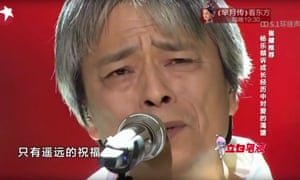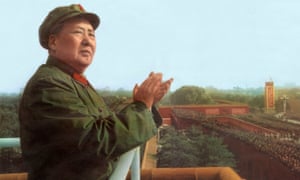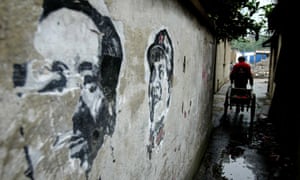From: Judy Amory <jmamory@post.harvard.edu>
Source: The Guardian (4/1/16)
Reality show singer breaks China’s Cultural Revolution taboo
Yang Le draws applause and tears as song tells of how he lost his father in Mao’s crackdown on perceived enemies, which began 50 years ago
By Tom Phillips in Beijing

Yang Le feared the show’s producers might attempt to censor the lyrics. Photograph: China Dragon TV
N early half a century after his father plunged to his death from the roof of a Beijing university, Yang Le stepped out on to the stage to tell millions of Chinese television viewers how Chairman Mao’s Cultural Revolution had torn his family apart.
“When I was young we were a family of six … My father was handsome, mum was young and beautiful,” sang the silver-haired contestant on China Star, the country’s answer to the X-Factor. “After the Cultural Revolution only five of us were left.”
When his lament-filled, taboo-breaking performance ended, Yang bit his lower lip. Applause rippled through the theatre; the judges leapt to their feet; tears streamed down cheeks.
“I wasn’t sure I’d be able to get through the song,” the 60-year-old musician recalled in a tearful interview. “I had to force myself to relax because it wasn’t only me who went through this. Millions of other families went through this in China.”
May marks 50 years since China was convulsed by Mao Zedong’s Great Proletarian Cultural Revolution, a bewildering and bloody attempt by the leader to reshape and reassert control over the Communist party he had helped found in 1921 by mobilising the nation’s youth.
A new book on the period by Dutch historian Frank Dikötter reveals the grotesque catalogue of violence inflicted upon alleged “class enemies” and intellectuals as teenage Red Guards fanned out across urban China with orders to “sweep away monsters and demons”.
Victims were beaten, flogged, stoned and scolded by “Mao’s Little Generals” or forced to swallow nails and excrement as jeering crowds looked on. Homes and places of worship were ransacked, pillaged and burned. One teacher killed himself after being set upon by students who forced him to drink ink. Another was doused in petrol and set alight. Others were electrocuted or even buried alive.
“[It was] a demented environment, an Alice-in-Wonderland world, governed only by its mad logic,” Percy Cradock, then a senior British diplomat in Beijing, recalls in his memoirs. “The country was in the grip of a nightmare.”
Among the estimated two million people who lost their lives over the coming decade was Yang Le’s father, Wang Yuguo, a lecturer in industrial economy at Beijing’s prestigious Renmin University.
“My father was persecuted and he killed himself. He jumped from the roof of a building,” the singer said.
“At Renmin University you heard of professors killing themselves every day. It was horrible. I would hear someone crying and we would wonder who was crying and whose family was suffering those bad things.”
The premature death of Yang’s father devastated his family. His mother was forced to sell her dead husband’s belongings – and even her own blood – to feed the couple’s four children. Yang’s three siblings were packed off to the countryside for “re-education” as part of an attempt to rein in Mao’s marauding Red Guards.
Finally, Yang’s mother remarried and moved south to Jiangxi province. “She felt sad,” he said. “But she had no choice.”
China’s Communist party leaders have officially classified the Cultural Revolution as a mistake.

Mao Zedong reviews the army of the Great Proletarian Cultural Revolution in 1967. Photograph: Apic/Getty Images
A 1981 resolution noted that the decade-long upheaval “was responsible for the most severe setback and the heaviest losses by the party, the state and the people since the founding of the People’s Republic” in 1949.
Two years earlier the People’s Liberation Army marshall Ye Jianying labelled the period “an appalling catastrophe suffered by all our people”.
Yet half a century after the mayhem began the subject remains largely a taboo within China. School textbooks skirt around the period and discussion of Mao’s central role in the disaster is shunned.
Yang, a classically trained flautist who fled China in the wake of the 1989 Tiananmen crackdown and went on to study at the Schola Cantorum de Paris, said few songs had examined the heartbreak caused by the Cultural Revolution.
The government’s refusal to revisit that era means much about what unfolded in the 10 years between the Cultural Revolution’s start in May 1966 and Mao’s death in 1976 remains hazy.
For example, the exact circumstances surrounding the death of Yang’s father are still shrouded in mystery.
The singer said he believed his father had been interrogated and beaten before he was found dead on 4 December 1968 at the age of 39.
“I heard they used shoes to beat my father in the face. He felt humiliated. He couldn’t stand it,” Yang said.
But before his corpse was cremated, Yang’s mother spotted an indentation in her dead husband’s skull, leading her to suspect he had been set upon by Red Guards and then pushed to his death. “If somebody jumps from a building you would expect to see a problem with their neck, an internal problem, not the kind of trauma that you can see,” he said.
The 50th anniversary of the Cultural Revolution is unlikely to shine fresh light on such cases. Dikötter predicted that China’s leaders would seek to remember the occasion with total silence.
“[Chinese people] have been told again and again and again: you had better forget. Let’s just get on with it,” the historian said.
“The team in charge is very well aware that there is a danger to its legitimacy and its credibility [in discussing past mistakes]. And it knows very well that history is one of the pillars of its own legitimacy and it will not have it undermined. It is as simple as that.”
The party’s determination to bury the horrors of the Cultural Revolution made Yang Le’s prime-time television performance, in November last year, even more unusual.

Fading portraits and slogans from the 1960s and 1970s, when Mao’s cult of personality was at its peak, can still be found across China. Photograph: AP
The singer said he had feared the show’s producers might attempt to censor the lyrics but had lobbied against that with the help of Cui Jian, a friend and well-known Chinese rock star. The channel relented.
“There are movies and novels that tell stories from that time so why can we not sing this kind of song?” Yang said.
Dikötter said Beijing had been largely successful in “stamping out the memory of the Cultural Revolution” and staving off calls for any significant probe into one of the darkest chapters in Chinese history.
“I think that does leave scars. That does leave a society that is very traumatised by who did what to whom without any sense of redress or justice,” he said.
But the outpouring of emotion triggered by Yang’s performance suggests many have not forgotten the hurt and suffering inflicted on their families.
Yang, who cites Gustav Mahler and Serge Gainsbourg among his influences, said he saw music not simply as entertainment but as a way of inspiring listeners to confront painful truths.
He attributed the tears shed over his performance to the profound emotional burden those who witnessed the excesses of the Cultural Revolution still carried with them.
“Recalling that time in history is something that is extremely heavy for our generation.”
“It was a catastrophe,” he said. “It was like a war.”
Additional reporting by Christy Yao